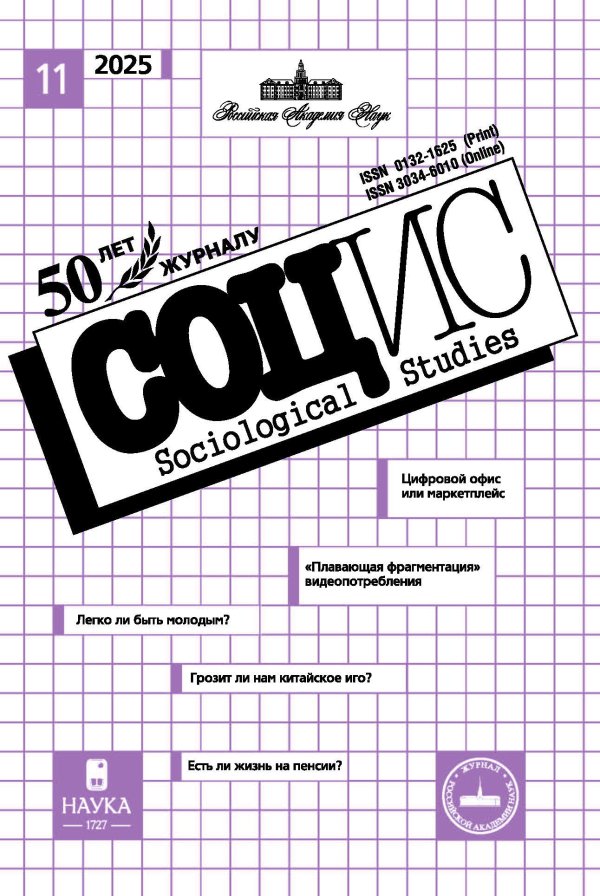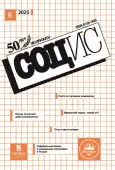Functions of historical memes in digital practices of youth (the case of Omsk)
- Authors: Derevyanchenko Y.I.1, Limasova S.P.2
-
Affiliations:
- Omsk State University named after F. M. Dostoevsky
- Public Opinion Foundation
- Issue: No 6 (2025)
- Pages: 15-27
- Section: SOCIOLOGY OF MASS COMMUNICATIONS
- URL: https://bakhtiniada.ru/0132-1625/article/view/304502
- DOI: https://doi.org/10.31857/S0132162525060025
- ID: 304502
Abstract
The article analyzes the role of historical Internet memes in the digital practices of young people. The empirical basis of the paper is a research conducted in 2023–2024 among the student audience and high school students of Omsk, including: 1) content analysis of 600 most popular historical memes from thematic communities of social networks; 2) a series of five focus groups with the participation of 39 respondents; 3) an online survey of 11th grade students (N = 357). The authors identify three key functions of historical memes in the youth environment: 1) communicative (a tool of group identification and maintenance of social ties); 2) mnemonic (a way of emotional consolidation of historical knowledge); 3) personalizing (a form of personal interpretation of official historical narratives). Special attention is paid to the revealed contradiction between institutional memory policy and spontaneous meme practices, which, on the one hand, contribute to the fragmentation of historical consciousness, and, on the other hand, provide personalization and emotional assimilation of the past.
Full Text
About the authors
Yuri I. Derevyanchenko
Omsk State University named after F. M. Dostoevsky
Author for correspondence.
Email: DerevianchenkoIuI@omsu.ru
Cand. Sci. (Philos.), Assoc. Prof.
Russian Federation, OmskSofya P. Limasova
Public Opinion Foundation
Email: s_limasova@mail.ru
Research Intern
Russian Federation, NovosibirskReferences
- Anikin D. A. (2017) Visualization of Historical Memory in a Network Society: Methodological Foundations of the Study. Logos et Praxis. No. 3: 32–39. (In Russ.)
- Artamonov D. S., Tikhonova S. V. (2018) Meming in the Politics of Memory of Russia. Izvestiya Saratovskogo un-ta [Bulletin of the Saratov University. New Series. Ser. Sociology. Political Science]. Vol. 18. Iss. 4. No. 4: 450–457. doi: 10.18500/1818-9601-2018-18-4-450-456. (In Russ.)
- Artamonov D. S., Tikhonova S. V. (2022) Memory politics in Internet memes: from visualization of history to fakes. Polis. Politicheskiye issledovaniya [Polis. Political studies]. Vol. 31. No. 5: 75–87. doi: 10.17976/jpps/2022.05.06. (In Russ.)
- Artamonov D. S., Tikhonova S. V. (2021) Historical memory in social media. St. Petersburg: Aleteya. (In Russ.)
- Artamonov D. S. (2023) Media Memory in the Digital Age. Saratov: SGU. (In Russ.)
- Brodovskaya E. V., Shumilova O. E. (2013) Russian Users and Non-Users: Ratio and Main Features. Monitoring obshchestvennogo mneniya: ekonomicheskie i social’nye peremeny [Monitoring of Public Opinion: Economic and Social Changes]. No. 3(115): 5–18. (In Russ.)
- Vasiliev A. G. (2008) Modern Memory Studies and the Transformation of Classical Heritage. In: Dialogues with Time: Memory of the Past in the Context of History / Ed. by L. P. Repina. Moscow: Krug: 19–49. (In Russ.)
- Gibadullina N. M. (2014) Images of the Great Patriotic War in Internet Demotivators. Sistema tsennostey sovremennogo obshchestva [The System of Values of Modern Society]. No. 34: 64–68. (In Russ.)
- Drucker M., Suvorova N. A. (2022) Mediamem as a means of representing value guidelines in social media. Chelyabinskiy gumanitariy [Chelyabinsk Humanitarian]. No. 1(58): 13–21. doi: 10.47475/1999-5407-2022-10102. (In Russ.)
- Zharchinskaya K. A. (2014) Myth and historical memory: images of the Slavic “Tradition” in social networks. Vestnik Tomskogo gosun-ta [Bulletin of Tomsk State University. History]. No. 4 (30): 97–103. (In Russ.)
- Information and analytical materials on the results of monitoring the activities of educational organizations of higher education in 2024 (2024). Moscow: MIREA – RTU. Main Information and Computing Center. URL: https://monitoring.miccedu.ru/iam/2024/_vpo/material.php?type=2&id=10904 (accessed 12.12.2024). (In Russ.)
- Kanashina S. V. (2018) Internet meme and precedent phenomenon. Vestnik Tomskogo gos. ped. un-ta [Bulletin of Tomsk State Pedagogical University]. Iss. 4(193): 122– 127. DOI: 1023951/1609-624X-2018-4-122-127. (In Russ.)
- Marchenko T. V. (2021) Precedent in media space discourses: on the problem of studying verbal and non-verbal phenomena. Gumanitarnyye i yuridicheskiye issledovaniya [Humanitarian and legal studies]. No. 2: 143–150. doi: 10.37493/2409-1030.2021.2.20. (In Russ.)
- Solovieva D.Yu. (2018) New historicism and representations of history in the digital environment. Vestnik Moskovskogo un-ta [Bulletin of Moscow University. Series 10. Journalism]. No. 4: 26–54. doi: 10.30547/vestnik.journ.4.2018.2654. (In Russ.)
- Halbwachs M. (2005) Collective and historical memory. Neprikosnovenny zapas. [Emergency reserve]. No. 2–3: 8–27. (In Russ.)
- Shutaleva A. V., Putilova E. A. (2017) Internet meme as a way of reproducing social memory. Manuscript. No. 12–3(86): 219–221. (In Russ.)
- Koopmans R., Olzak S. (2004) Discursive Opportunities and the Evolution of Right-Wing Violence in Germany. American Journal of Sociology. Vol. 110. No. 1: 198–230. doi: 10.1086/386271.
- Shifman L. (2013) Memes in a Digital World: Reconciling with a Conceptual Troublemaker. Journal of Computer-Mediated Communication. Vol. 18. Iss. 3: 362–377. doi: 10.1111/jcc4.12013.










